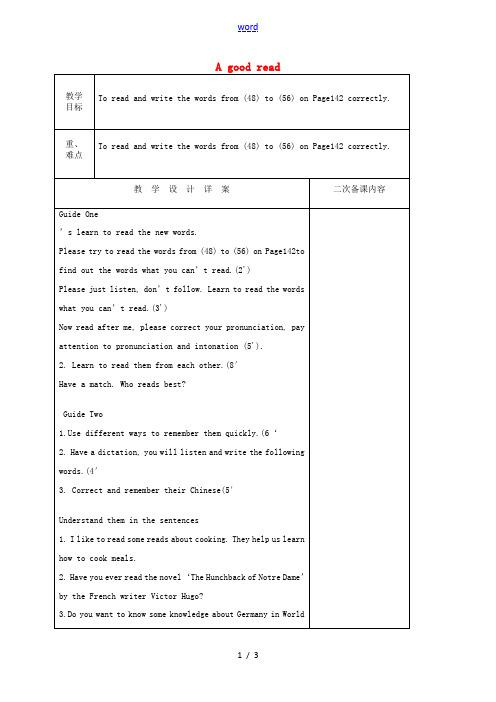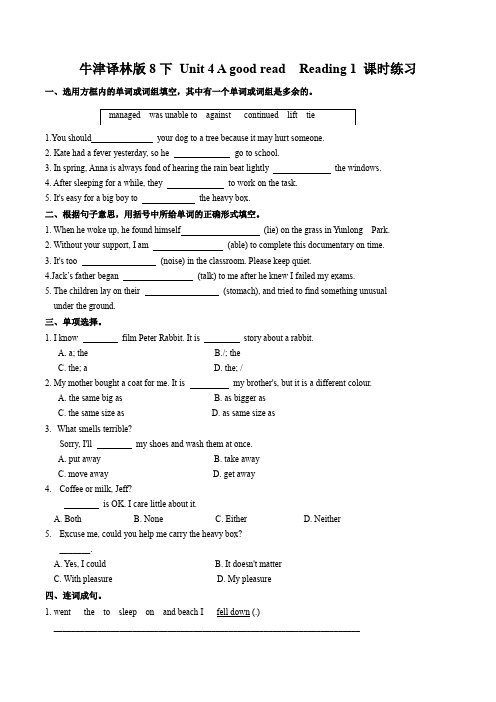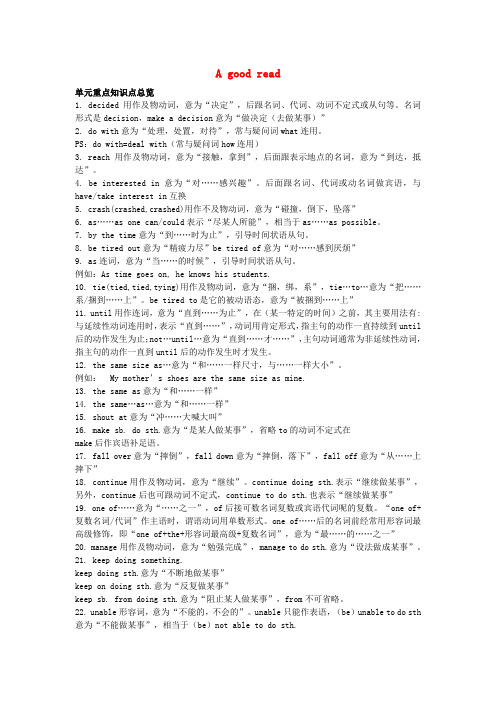2019春八年级英语下册Unit4Agoodread课时内容精讲课时作业新版牛津
牛津译林版八年级英语下册 Unit4 a good read 课文要点解析

牛津译林版八年级英语下册Unit4 a good read 课文要点解析Comic strip1.Have you decided what to do with these books, Hobo?霍波,你已决定怎样处理这些书了吗? (教材第48页)I)decide此处用作及物动词,意为“决定”,后跟名词、代词、动词不定式或从句等。
She decided to book two tickets to Hainan online.她决定在网上预订两张去海南的票。
Let's first decide where we should go.咱们先决定应该去什么地方。
[拓展]decide的名词形式是decision,意为“决定”。
make a decision (to do sth. )意为“做决定(做某事)”。
You need to make a decision today.你今天需要做个决定。
中考.链接(2017.江苏苏州).Jack, why have you decided_________Chinese folk music as a course?一To learn more about Chinese culture.A. takeB. takenC. takingD. to take解析:我们可用“固定搭配法”解答此题。
decide to do sth.为固定搭配,意为“决定做某事”,故选D。
句意:“杰克,你为什么决定选择中国民间音乐这门课”“为了更多地了解中国文化。
” 答案:D(2)do with意为“处理;处置;对待”,常与疑问词what连用。
What did you do with those old keyboards?你怎么处理那些旧键盘了?The new teacher didn't know what to do with students.那位新老师不知道如何对待学生。
八年级英语下册 Unit 4 A good read单词教案 (新版)牛津版-(新版)牛津版初中八年

作业设计
完成以上练习
教学反思
7.The robber tied my hands and legs.
8.When the tiny man was climbing over the chair, he fell down on the ground.
9.I had a stomach this morning.
10.My mother doesn’t go to bed until my father returned home every evening.
2. She had a cold last week, so she was u________ to join the swimming petition.
3.—Have you ever read The_______(丑陋的) Duckling By Hans Christian Anderson?
2. Have you ever read the novel ‘The Hunchback of Notre Dame’ by the French writer Victor Hugo?
3.Do you want to know some knowledge aboutGermanyinWorld War II?
7. Reading books is a good way to improve your k_______________.
8.She will_________(继续) her study for another year.
9.The tiny man was the same size as my littc, the famous _______(法国的) writer, was a man of great talent.
八年级英语下册_Unit 4 Reading1 课时练习

牛津译林版8下Unit 4 A good read Reading 1 课时练习一、选用方框内的单词或词组填空,其中有一个单词或词组是多余的。
1.You should your dog to a tree because it may hurt someone.2. Kate had a fever yesterday, so he go to school.3. In spring, Anna is always fond of hearing the rain beat lightly the windows.4. After sleeping for a while, they to work on the task.5. It's easy for a big boy to the heavy box.二、根据句子意思,用括号中所给单词的正确形式填空。
1. When he woke up, he found himself (lie) on the grass in Yunlong Park.2. Without your support, I am (able) to complete this documentary on time.3. It's too (noise) in the classroom. Please keep quiet.4.Jack’s father began (talk) to me after he knew I failed my exams.5. The children lay on their (stomach), and tried to find something unusualunder the ground.三、单项选择。
1. I know film Peter Rabbit. It is story about a rabbit.A. a; theB./; theC. the; aD. the; /2. My mother bought a coat for me. It is my brother's, but it is a different colour.A. the same big asB. as bigger asC. the same size asD. as same size as3.--What smells terrible?--Sorry, I'll my shoes and wash them at once.A. put awayB. take awayC. move awayD. get away4. --Coffee or milk, Jeff?--is OK. I care little about it.A. BothB. NoneC. EitherD. Neither5. --Excuse me, could you help me carry the heavy box?--_______.A. Yes, I couldB. It doesn't matterC. With pleasureD. My pleasure四、连词成句。
八年级英语下册Unit4Agoodread知识点总结及测试卷新版牛津版

A good read单元重点知识点总览1. decided用作及物动词,意为“决定”,后跟名词、代词、动词不定式或从句等。
名词形式是decision,make a decision意为“做决定(去做某事)”2. do with意为“处理,处置,对待”,常与疑问词what连用。
PS:do with=deal with(常与疑问词how连用)3. reach 用作及物动词,意为“接触,拿到”,后面跟表示地点的名词,意为“到达,抵达”。
4. be interested in 意为“对……感兴趣”。
后面跟名词、代词或动名词做宾语,与have/take interest in互换5. crash(crashed,crashed)用作不及物动词,意为“碰撞,倒下,坠落”6. as……as one can/could表示“尽某人所能”,相当于as……as possible。
7. by the time意为“到……时为止”,引导时间状语从句。
8. be tired out意为“精疲力尽”be tired of意为“对……感到厌烦”9. as连词,意为“当……的时候”,引导时间状语从句。
例如:As time goes on, he knows his students.10. tie(tied,tied,tying)用作及物动词,意为“捆,绑,系”,tie…to…意为“把……系/捆到……上”。
be tired to是它的被动语态,意为“被捆到……上”11. until用作连词,意为“直到……为止”,在(某一特定的时间)之前,其主要用法有:与延续性动词连用时,表示“直到……”,动词用肯定形式,指主句的动作一直持续到until 后的动作发生为止;not…until…意为“直到……才……”,主句动词通常为非延续性动词,指主句的动作一直到until后的动作发生时才发生。
12. the same size as…意为“和……一样尺寸,与……一样大小”。
牛津译林版八年级英语下册Unit4 A good read Reading课件(共22张PPT)

be tied to 被束缚于,被捆绑于……
The dog is tied to a tree.
他不想永远做那份无聊的工作。
He did not want to _b_e_t_i_ed__t_o_ the boring job.
Paragraph 3: Read and complete
Unit 4 Reading 2
Gulliver in Lilliput
When we are reading a story or a novel, we can try to find the following five points to catch its meaning.
1. When did it happen? 2. Where did it happen? 3. Who were the main characters? 4. What happened? 5. How did the main characters feel?
Gulliver f__f_el_t__ something on his leg. It mneck. At last, it s_s_to_o_d__ near his face. He looked d_d_o_w_n__ and saw a t__ti_n_y__ man. And the small man was the s_s_a_m__e_ size as his little finger.
2.Why did he fall down on the beach?
Because he was tired out.
1.as far as he could =as far as possible尽他所能的远
牛津译林版八年级下册Unit4《Agoodread》说课稿5

牛津译林版八年级下册Unit 4《A good read》说课稿5一. 教材分析《A good read》是牛津译林版八年级下册Unit 4的一篇阅读文章,主要介绍了一本好书对人们的影响以及如何选择适合自己的书籍。
通过本文的学习,学生可以提高阅读理解能力,了解好书对个人成长的重要性,并学会如何选择适合自己的书籍。
二. 学情分析八年级的学生已经具备了一定的英语基础,对阅读理解有一定的掌握。
但部分学生可能在阅读长篇文章时存在困难,对文章主旨和细节的把握不够准确。
因此,在教学过程中,需要关注学生的个体差异,引导他们掌握阅读技巧,提高阅读理解能力。
三. 说教学目标1.知识目标:学生能够掌握文章中的关键词汇和短语,理解文章的主旨和细节。
2.能力目标:学生能够运用阅读技巧,快速把握文章大意,提高阅读理解能力。
3.情感目标:学生能够认识到好书对个人成长的重要性,学会如何选择适合自己的书籍。
四. 说教学重难点1.重点:学生能够熟练阅读文章,理解文章的主旨和细节。
2.难点:学生能够运用阅读技巧,准确把握文章中的长句和难句。
五. 说教学方法与手段1.任务型教学法:通过设定各种任务,引导学生主动参与课堂,提高阅读理解能力。
2.合作学习:学生分组讨论,共同完成任务,培养团队协作能力。
3.情境教学法:创设情境,让学生在实际情境中运用所学知识。
4.信息技术手段:利用多媒体课件和网络资源,丰富教学内容,提高学生的学习兴趣。
六. 说教学过程1.导入:利用多媒体展示一些好书封面,引导学生谈论自己喜欢的书籍,激发学生的学习兴趣。
2.自主阅读:学生自主阅读文章,了解文章大意,回答相关问题。
3.课堂讨论:学生分组讨论,分享阅读心得,讨论如何选择适合自己的书籍。
4.深度阅读:教师引导学生分析文章结构,讲解重点词汇和短语,帮助学生准确理解文章内容。
5.实践环节:学生分组进行角色扮演,模拟推荐书籍的场景,运用所学知识。
6.总结提升:教师总结课堂所学,强调好书对个人成长的重要性,引导学生树立正确的阅读观念。
2019年春八年级英语下册Unit4AgoodreadPeriod4Grammar同步练习新版牛津版
7.__________________, what happened to Tom?8.If you want _______________ meat __________________, you must put it into the fridge.Ⅳ.写出下列句子的同义句1.Do you know how we can finish it on time?Do you know ________ ________ ________ ________ on time?2.I don't know when we will have the meeting.I don't know when ________ ________ ________ ________.3.The question is where we should put it.The question is where ________ ________ it.4.There are so many beautiful dresses. I can't decide which one I should buy. There are so many beautiful dresses. I can't decide ________ ________ ________________.5.The young woman doesn't know what she should do.The young woman doesn't know ________ ________ ________.Ⅴ.单项填空()1.—Didn't you see the zebra crossing? You ________ slow down!—Sorry, sir. Am I going to fail the test?A. can'tB. canC.mustn'tD. must()2.2018·重庆A—Must I go out to have dinner with you, Mum?—No, you________, my dear. You're free to make your own decision.A. shouldn'tB. mustn'tC.needn'tD. can't()3.2018·十堰—I went to Mount Wudang with my five friends in one small car last weekend.—Oh, my God! I think it ________ be an uncomfortable trip.A. mustB. can'tC.mayD. shouldn't()4.—What do you want to eat for lunch? I will prepare earlier today.—Honey, you ________. Let's go out to have something different.A.mustn'tB.can'tC.shouldn'tD.don't have to()5.2018·常熟一模—Do you mind telling me________ for the food by QR code(二维码) on the phone? —With pleasure.A.when to payB. how to payC.what to payD. where to payⅥ.2018·宿迁任务型阅读A good book can be satisfying, can improve your knowledge and can teach you alot. There are several ways to develop a lifetime reading habit.Set times. You should have a few set times every day when you'll read for at least 5—10 minutes, no matter what happens. For example, make it a habit to read during breakfast and lunch (and even dinner if you eat alone).Always carry a book. No matter where you go, take a book with you. When you leavethe house, make sure to have at least one book. You may keep the book in the car, or into the office or to anywhere you go, unless you're sure you won't have time to read.Make a list. Keep a list of all the great books you want to read. You can keepthis in a pocket notebook. Be sure to add to it whenever you hear about a good book. Keep a running list, and cross out the ones you have read.Find a quiet place. Find a place in your home where you can sit in a comfortable chair without television or computer near the chair. There should be no music or noisy family members.Set a high aim. For example, tell yourself that you want to read 50 books this year. Try your best to finish reading them. Just be sure you're still enjoying the reading.根据短文内容,完成表格。
2019年春八年级英语下册Unit4AgoodreadPeriod2ReadingⅠ听读本素材(新版)牛津版
1 Unit 4 A good readPeriod 2 Reading Ⅰ重点单词听,并跟读下列单词1. against prep . 紧靠,碰,撞2. tie vt . 捆,绑3. over prep . 从一边到另一边4. stomach n . 腹部;胃5. until conj . 直到……为止6. finger n . 手指7. tiny adj . 极小的8. continue vt . & vi . 继续9. either adv . (否定句中)也10. manage vt . & vi . 设法完成;管理11. lift vt . 举起,抬高;提高12. army n . 大批,大群13. must modal v . 应该,必须;一定14. unable adj . 不能的,不会的15. shoulder n . 肩膀听,并跟读下列单词变形1. stomach n . —stomachs pl .2. manage vt .&vi . —manager n . 经理3. unable adj . —able adj . (反义词) 重点短语听,并跟读下列短语1. by the time … 到……时候2. be tired out 筋疲力尽3. be tied to … 被绑在……4. the same size as … 与……一样大小5. shout at sb 对某人大喊6. fall over 摔倒7. a huge army of … 一大群……8. get away 逃跑。
Unit4Agoodread知识点归纳牛津译林版英语八年级下册
Unit 4 A good read 好的读物【重点单词】1.read[n.]读物2.decide[v.]决定(1)[n.]decision(2)decide to do sth.决定做某事=make decision to do sth.(3)decide + 从句3.reach[v.]伸手够到;到达,抵达4.cooking[n.]烹饪,烹调5.Germany[n.]德国6.knowledge[n.]知识7.spare[adj.]空闲的;多余的(1)in one’s spare time = in one’s free time8.French[adj.]法国(人)的9.ugly[adj.]丑陋的good-looking10.touch[v.]感动,触动(1)touching令人同情的,感人的,动人的,修饰物(2)touched感激的,受感动的,形容人的主观感受11.crash[v.]碰撞;撞击12.against[prep.]紧靠,碰,撞(1)反对—>for(2)违背;违反(3)以防13.as[conj.]当...时;因为,由于14.rise[v.]上升,升起(1)rise上升;升起;增加。
指日月星辰等升起、潮水上涨、温度上升等(2)raise举起;提升;增加。
主语通常是人15.tie[v.]捆,绑(1)tie...to...把...绑在...上(2)tie sb./sth. up=tie up sb./sth.16.over[prep.]从一边到另一边17.stomach[n.]腹部;胃18.until[conj.]直到...为止19.around[adv.]大约;周围20.continue[v.]继续(1)continue to do sth.(2)continue doing sth.(3)continue with sth.21.either[adv.](否定句中)也(1)too,also,as well22.manage[v.]设法完成;管理(1)manage to do sth.设法做成某事,通过努力成功做到某事(2)try to do sth.尽力做某事,事情不一定做成功23.lift[v.]举起,抬高;提高24.army[n.]大批,大群an army of一大群25.unable[adj.]不能的,不会的(1)be unable to do sth.(2)be able to do sth.26.wonder[v.]想知道,想弄明白,琢磨(1)wonder + 疑问词+ to do(2)(3)wonder if/whether...27.advise[v.]建议,忠告,劝告(1)(2)28.recommend[v.]推荐(1)recommend that(2)(3)recommend sb. for...推荐某人做...(4)recommend sb. as...推荐某人担任(5)(6)29.review[n.]评论30.return[v.]归还31.refuse[v.]拒绝,回绝(1)refuse to do sth.(2)refuse sb. sth.32.success[n.]成功33.translate[v.]翻译(1)translate...into...把...翻译成...(2)34.sales[n.][pl.]销售量35.online[adv.]在线,联网36.sail[v.]航行37.confidence[n.]信心(1)[adj.]confident(2)be/feel confident about...对...充满信心(3)have confidence in...对...有信心(4)lose confidence in...失去信心(5)lack confidence缺乏信心38.experience[n.]经历,经验39.advice[n.]建议,忠告,劝告40.habit[n.]习惯【重点短语】1.do with处理(1)do with通常和what连用(2)deal with通常和how连用2.as + 形容词/副词原级+ as one can尽某人所能地...3.be tired out 筋疲力尽(1)be tired of (doing) sth.对...感到厌烦4.look down低头看,向下看5.the same...as...与...一样...6.7.fall over 摔倒8.try to do sth.努力做某事,尽力做某事9.10.hand in 上交,递交11.and so on ……等等12.on time 准时at times 有时in time及时13.so far 到目前为止14.at a time 每次,依次15.open up 开启;开创;开辟【重点语法】(一)疑问词+动词不定式1.“疑问词+动词不定式”结构在句中的功能(1)作主语,谓语动词用单数形式①什么时候开会是个问题When to have the meeting is a question.(2)作表语①问题在于谁去那里。
牛津译林版八年级英语下册Unit 4 A good read reading课件(共20张PPT)
Para.3
How big was the small man? He was the same size as Gulliver’s little finger.
Who can read Para.3 with surprise for us?
Where was I?
Who was this tiny person?
After Gulliver’s ship…
Para.1
Para.2
swam – tired out
woke up – could not move
– fell down – went to sleep — be tied
Para.3-4
Para.5
felt-lookedmove up-started down-saw climbing-fall over
If you are tiny men,
what will you talk about ?
small men Para.5
Gulliver
began t_a_lk_i_ng__t_o_h_i_m;
could not u_n_d_e_r_st_a_n_d_____;
didn’t know _w_h_at__t_o_s_a_y____;
2. Try to read the book of Gulliver’s Travels.
一 个 人 所 这受 样的 的教 人育 才超 有过 学了 问自 。己 的 智 力 ,
You made my day!
我们,还在路上……
Unit 4 Reading Ⅰ
Gulliver’s Travels
by
Jonathan Swift
- 1、下载文档前请自行甄别文档内容的完整性,平台不提供额外的编辑、内容补充、找答案等附加服务。
- 2、"仅部分预览"的文档,不可在线预览部分如存在完整性等问题,可反馈申请退款(可完整预览的文档不适用该条件!)。
- 3、如文档侵犯您的权益,请联系客服反馈,我们会尽快为您处理(人工客服工作时间:9:00-18:30)。
1
Unit4
❶dowith的用法
Haveyoudecidedwhattodowiththesebooks,Hobo? 你已经决定好怎样处理这些书了吗,霍波?(P48)
do with意为“对付,处理”,相当于及物动词,在特殊疑问句中,do with 与what 搭配使用。例如:
What do you do with this problem? 你怎样处理这个问题?
注意:deal with也意为“对付, 处理”,用于特殊疑问句中,与how 搭配使用。例如:
I don’t know how to deal with the problem.我不知道怎样处理这个问题。
❷spare的用法
Whatdoyouliketoreadinyoursparetime? 你在空闲时间喜欢读什么书?(P49)
1.spare是形容词,意为“空闲的,多余的”。in one’s spare time意为“在某人的空闲时间里” 例如:
How do you spend your spare time? 你怎样度过你的空闲时间?
2.spare也可作动词,意为“为……留出,匀出”。例如:
Please spare some time for your hobbies.请为你的爱好留出一点时间。
❸asfaras的用法
Afterourshipcrashedagainsttherocks,IswamasfarasIcould.在我们的船触礁以后,我尽可能远地向前游。
(P50)
1.as far as 意为“与……一样远,一直到”。例如:
We walked as far as the river.我们一直走到河边。
2.as far as也可意为“就……而言,从……来看,尽……所能” 。例如:
We’ll help you as far as it is possible.我们会尽可能帮助你。
❹until的用法
2
Itmovedupovermystomachandneckuntilitwasstandingnearmyface.它在我肚子和脖子上移动直到它站在离我
脸很近的地方。(P50)
until 意为“直到”,表示某一种动作一直持续到某一时间。用在肯定句中,句子的谓语动词必须用延续性
动词。not...until意为“直到……才”,表示直到某一时间,某一动作才发生,之前该动作并没有发生。用在
否定句中,主句中的谓语动词通常是短暂性动词。例如:
I studied English until 9 o’clock last night.昨晚我学英语直到九点钟。
I didn’t leave until 9 o’clock last night.我昨晚直到九点钟才离开。
❺either的用法
Ididnotknowwhattosayeither.我也不知道说什么。(P51)
1.either作副词,用于否定句中,意为“也”,通常置于句末。either还可以用来强调否定含义的短语。例如:
I don’t like the red shirt and I don’t like the green one either.我不喜欢这件红色衬衫我也不喜
欢这件绿色的。
As for me,I shall not return there either.如果是我,我也不会回到那里去。
2.either作代词,意为“(两者之中)任何一个”,在句中作主语时,谓语动词用单数形式;用作定语时,只能修
饰单数名词。例如:
Either of the books is popular with the students.两本书都受到学生的欢迎。
❻lookfor的用法
Forexample,TreasureIslandtellsthestoryofayoungboywhosailedtheseatolookforhiddentreasure.比如,
《金银岛》讲的是一个小男孩出海寻找宝藏的故事。(P59)
1.look for意为“寻找”,是有目的地找,强调“寻找”这一动作。例如:
—What are you looking for?你在找什么?
—I’m looking for my bike.我在找我的自行车。
2.find意为“找到,发现”,强调找的结果,其宾语往往是某个丢失的东西或人。例如:
—Did you find Li Ming yesterday?你昨天找到李明了吗?
3
—No.We looked for him everywhere,but didn’t find him.没有。我们到处找了,但没有找到他。
3.find out着重表示通过理解、分析、思考、询问等弄清楚一件事情,其后的宾语常常是某个情况、事实。例
如:
Please find out when the train leaves.请查一下火车什么时候离站。
❼experience的用法
Ialsowanttotravelandhaveexcitingexperiencesinthefuture.在将来我也想去旅游,并且有激动人心的经历。
(P59)
1.experience作名词,表示“经验,体验”时,为不可数名词;而表示“经历”时,通常为可数名词。表示做某事
的经验,其后接 in doing sth。例如:
I know from experience that he will arrive late.据我的经验,他会迟到的。
He had many interesting experiences while travelling in Africa.他在非洲旅行时,有很多有趣的经历。
He has had many years’ experience in planting wheat.他有多年种小麦的经验。
2.experience作动词,表示“体验,经历”等,只用作及物动词。例如:
The child had never experienced kindness.这孩子从未受过善待。
He experienced great hardships for the first time in his life.他有生以来第一次经历了巨大的困难。
3.experienced为形容词,意思是“有经验的”。例如:
He’s quite experienced in teaching beginners.他在教初学者方面很有经验。
